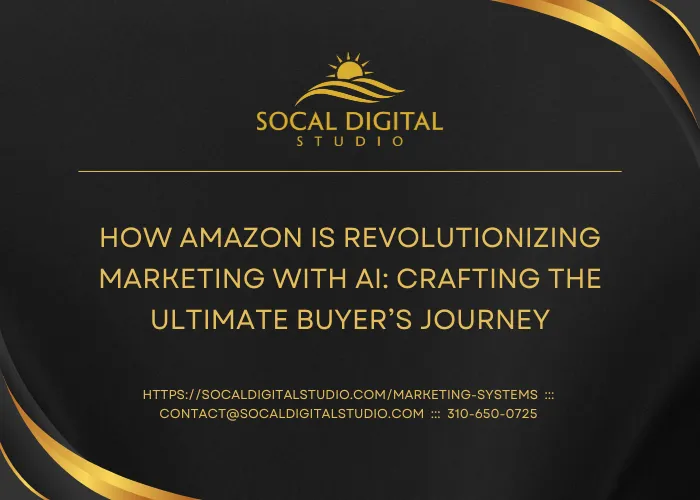PROPELLING SUCCESSFUL BUSINESSES
Actionable Best Practices

How Amazon Is Revolutionizing Marketing with AI: Crafting the Ultimate Buyer’s Journey
“I often tell my students not to be misled by the name 'artificial intelligence' - there is nothing artificial about it. AI is made by humans, intended to behave by humans, and, ultimately, to impact humans' lives and human society.” - Fei-Fei Li
Introduction
In the ever-evolving world of e-commerce, Amazon stands at the forefront of innovation, continuously leveraging artificial intelligence (AI) to refine its marketing strategies and enhance the buyer's journey. By integrating AI into various facets of its operations, Amazon has transformed how products and services are marketed, creating a seamless, personalized shopping experience for millions of users worldwide. In this article, we delve into how Amazon is utilizing AI to revolutionize its marketing efforts and create an unparalleled buyer’s journey on its platform.

Personalized Recommendations: The Power of AI
One of the most prominent ways Amazon uses AI is through its sophisticated recommendation engine. This system analyzes a vast array of data points, including past purchases, browsing history, and customer preferences, to suggest products that a user is likely to be interested in. This personalized approach not only enhances the shopping experience but also significantly boosts sales.
For instance, if a customer frequently purchases organic foods, Amazon’s AI algorithms will prioritize showing them similar or complementary products, such as organic snacks or eco-friendly kitchenware. This level of personalization has been instrumental in driving Amazon’s impressive conversion rates.
Alexa: Voice-Activated Shopping Assistant
Amazon’s AI-driven voice assistant, Alexa, has revolutionized the way customers interact with the platform. Alexa allows users to search for products, place orders, and receive personalized recommendations using simple voice commands. This hands-free shopping experience is not only convenient but also highly personalized, as Alexa can remember previous interactions and preferences to make tailored suggestions.
For example, a user might ask, “Alexa, what are some deals on electronics today?” Based on the user’s purchase history and preferences, Alexa can provide a curated list of relevant deals, streamlining the shopping process and enhancing user satisfaction.
Dynamic Pricing: Real-Time Adjustments for Maximum Profit
Another key application of AI in Amazon’s marketing strategy is dynamic pricing. By continuously analyzing market conditions, competitor pricing, demand, and other relevant factors, Amazon’s AI algorithms can adjust prices in real-time to optimize sales and profitability.
For example, during peak shopping periods like Black Friday or Cyber Monday, Amazon’s dynamic pricing system ensures that prices remain competitive while maximizing profit margins. This not only attracts more customers but also encourages repeat purchases by offering the best possible deals.
Automated Advertising: Targeting the Right Audience
Amazon’s AI-powered advertising platform allows sellers to create highly targeted ad campaigns that reach the right audience at the right time. By analyzing customer behavior, purchase history, and demographic data, Amazon can deliver ads that are more likely to resonate with potential buyers.
For instance, a seller of fitness equipment can use Amazon’s advertising platform to target health-conscious consumers who have previously purchased related items, such as yoga mats or protein supplements. This targeted approach increases the likelihood of conversion and enhances the overall effectiveness of ad campaigns.
Enhanced Search Functionality: Making Discovery Easier
AI also plays a crucial role in improving Amazon’s search functionality. By utilizing natural language processing (NLP) and machine learning algorithms, Amazon can better understand and interpret user queries, providing more accurate and relevant search results.
For example, if a customer searches for “wireless earbuds for running,” Amazon’s AI-powered search engine can prioritize products that are specifically designed for athletic use, ensuring that users find exactly what they’re looking for quickly and efficiently.
Customer Insights: Leveraging Data for Better Decisions
Amazon’s AI capabilities extend beyond just marketing and personalization. The company uses AI to gather and analyze vast amounts of customer data, providing valuable insights that drive business decisions. By understanding customer behavior and preferences, Amazon can continually refine its offerings and marketing strategies to better meet the needs of its users.
For instance, if data analysis reveals a growing trend in sustainable products, Amazon can adjust its inventory and marketing efforts to cater to this emerging market, staying ahead of the competition and aligning with customer values.
Conclusion
Amazon’s innovative use of AI in marketing and the buyer’s journey is a testament to the transformative power of technology. By harnessing the capabilities of AI, Amazon has created a highly personalized, efficient, and engaging shopping experience that sets the standard for the e-commerce industry. As AI technology continues to evolve, we can expect Amazon to further refine and enhance its marketing strategies, solidifying its position as a leader in the digital marketplace.
References
Amazon’s recommendation engine: How Amazon's recommendation engine works
Alexa and voice shopping: The rise of voice shopping with Amazon Alexa
Dynamic pricing strategies: Amazon’s dynamic pricing explained
AI-powered advertising: How Amazon uses AI to revolutionize advertising
Enhanced search functionality: Amazon’s AI search technology
Customer insights and data analysis: Amazon's use of AI for customer insights
We Help Small Businesses Leverage AI to Level-Up their Marketing Systems
Schedule a free AI Marketing impact and strategic session with us by CLICKING HERE to learn how to adopt AI as a competitive advantage in your company.
Recommended Reading: "Amazon Unbound: Jeff Bezos and the Invention of a Global Empire" by Brad Stone.

SUBSCRIBE TO THIS NEWSLETTER TO STAY IN THE KNOW
Please contact us with topics you would like us to cover
Dominate with Our Affordable All-in-One Marketing System
SoCal Digital Studio's Advanced All-In-One Marketing System is built to help local businesses attract, engage, convert, and retain customers with speed and consistency. It automates the communication that is essential to a business' success and continuing growth. Request a free marketing audit to uncover weaknesses and use SoCal Digital Studio's Marketing System to not only compete, but dominate the market.
All-in-One Marketing System
Leverage Powerful Marketing Tools and Sales Funnels to Nurture and Convert Customers at an Affordable Price
Our marketing system has it all and allows you to (1) capture leads via landing pages, forms, calendars, and inbound phone calls; (2) message leads via phone calls, SMS, emails, and Messenger; and (3) close leads with built-in tools for payments and analytics (including call tracking).You can also create landing pages and funnels, set up automated follow-up campaigns, schedule appointments, fine-tune marketing and sales processes, and manage all of it so nothing slips between the cracks in your dedicated marketing system.
Stellar Package
Monthly Subscription
12-Month Subscription is $4970
One-Time Set-Up Fee Varies
$297
Full System Access
5,000 Contacts
1,500 SMS or Calls
15,000 Emails
1-3 Team Members
Galactic Package
Monthly Subscription
12-Month Subscription is $6970
One-Time Set-Up Fee Varies
$497
Full System Access
7,500 Contacts
3,000 SMS or Calls
30,000 Emails
4-10 Team Members
Cosmic Package
Monthly Subscription
12-Month Subscription Is $9970
One-Time Set-Up Fee Varies
$697
Full System Access
10,000 Contacts
4,500 SMS or Calls
45,000 Emails
11-15 Team Members
